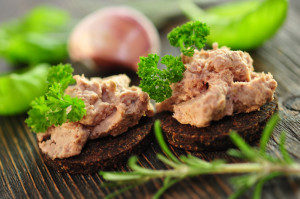Once the dough has been thoroughly kneaded, it is left to rest for a number of hours. Placed into a sealed baking tin, it then spends the next 16 hours, sometimes even as long as 24 hours, in a baking chamber or rack oven at a temperature just above 100 degrees Celsius. This is a unique Westphalian process in terms of duration and temperature, and serves to preserve both vitamins and fibres, caramelise the fructose present in the grains, and help the wholemeal to stick together.
Westphalian pumpernickel is therefore almost black in colour, slightly sweet, wonderfully moist and has no dough bubbles to speak of. As it has no crusts either, it is a true star, both visually and in terms of taste. It boasts the same wholesome taste inside and out – and has done for more than 500 years.
This post is also available in Deutsch.

